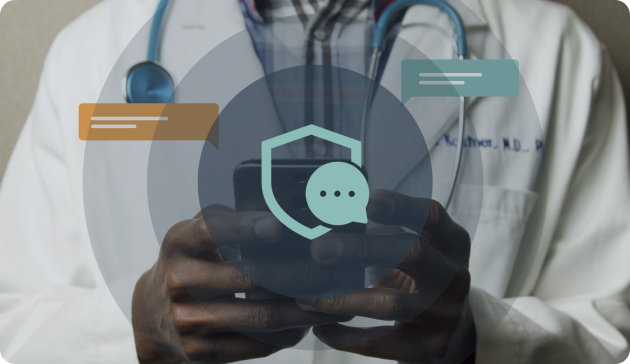
Balancing LLM Innovation with Security: Safeguarding Patient Data in the Age of AI
Large language models (LLMs) are revolutionizing healthcare, offering new possibilities for analyzing medical records, generating personalized treatment plans, and driving medical research. However, for healthcare institutions unlocking the potential of LLMs comes with significant challenges: patient privacy, security vulnerabilities, and potential biases within the LLM itself.
Challenges of LLMs in Healthcare
For any organization that deals with patient data, incorporating LLMs into workflows raises challenges – each of which needs tactical solutions:
Patient data privacy:
LLMs require access to patient data to function effectively. However, patient data often includes highly sensitive information such as names, addresses, and diagnoses, and requires protection during LLM interactions.
Security vulnerabilities:
Without effective safeguards in place, malicious actors can exploit vulnerabilities in AI systems. Malicious prompt injection attacks or gibberish text can disrupt the LLM’s operation or even be used to steal data.
Potential biases:
LLMs, like any AI model, can inherit biases from the data they are trained on. Left unmitigated, these biases can lead to unfair or inaccurate outputs, like patient care decisions, in healthcare settings.
Risk of toxic outputs:
Even with unbiased prompts, LLMs can potentially generate outputs containing offensive, discriminatory, or misleading language. A solution is required to identify and warn users about such potentially harmful outputs.
LLM Security: A Guardian for Secure and Responsible AI in Healthcare
To address these challenges, Styrk offers LLM Security, a preprocessing tool that acts as a guardian between healthcare professionals and the LLM. LLM Security provides critical safeguards, especially ensuring the secure and responsible use of LLMs in safely handling patient data.
LLM Security boasts three key features that work in concert to protect patient privacy, enhance security, and mitigate bias:
De-identification for patient privacy:
LLM Security prioritizes patient data privacy. It employs sophisticated de-identification techniques to automatically recognize and de-identify sensitive data from prompts before they reach the LLM. This ensures that patient anonymity is maintained while still allowing the LLM to analyze the core medical information necessary for its tasks.
Security shield against prompt injection attacks & gibberish text:
LLM Security shields against malicious prompt injection attacks. It analyzes all prompts for unusual formatting, nonsensical language, or hidden code that might indicate an attack. When LLM Security detects suspicious activity, it immediately blocks it from processing the potentially harmful prompt, protecting the system from disruption and data breaches.
Combating bias for fairer healthcare decisions:
LLM Security recognizes that even the most advanced AI models can inherit biases from their training data. These biases can lead to unfair or inaccurate outputs in healthcare settings, potentially impacting patient care decisions. LLM Security analyzes the LLM’s output for language associated with known biases. If potential bias is flagged, then warnings prompt healthcare professionals to critically evaluate the LLM’s results and avoid making biased decisions based on the AI’s output. LLM Security empowers healthcare providers to leverage the power of AI for improved patient care while ensuring fairness and ethical decision-making.
Warning for toxic outputs:
Even unbiased prompts can lead to outputs containing offensive, discriminatory, or misleading language. LLM Security analyzes the LLM’s output for signs of potential toxicity. If such a prompt is detected, then healthcare professionals are alerted, encouraging them to carefully evaluate the LLM’s response and avoid using any information that may be damaging or misleading.
The Future of AI in Healthcare: Innovation with Responsibility
By implementing Styrk’s LLM Security, organizations can demonstrate a strong commitment to leveraging the power of LLMs for patient care while prioritizing data security, privacy, and fairness. LLM Security paves the way for a future where AI can revolutionize healthcare without compromising the ethical principles that underpin patient care.
